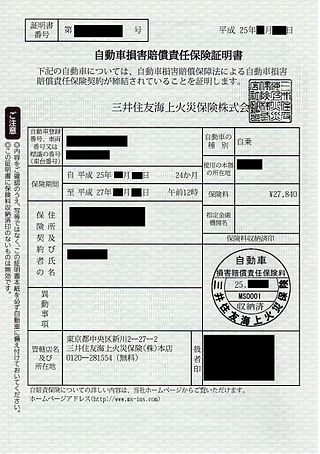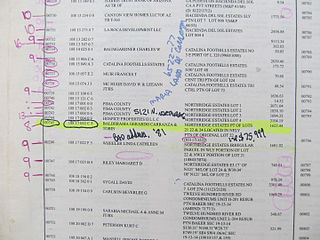Related Research Articles
A mortgage is a legal instrument of the common law which is used to create a security interest in real property held by a lender as a security for a debt, usually a mortgage loan. Hypothec is the corresponding term in civil law jurisdictions, albeit with a wider sense, as it also covers non-possessory lien.
E-ZPass is an electronic toll collection system used on toll roads, toll bridges, and toll tunnels in the Eastern United States, Midwestern United States, and Southern United States. The E-ZPass Interagency Group (IAG) consists of member agencies in several states, which use the same technology and allow travelers to use the same transponder on toll roads throughout the network.

A department of motor vehicles (DMV) is a government agency that administers motor vehicle registration and driver licensing. In countries with federal states such as in North America, these agencies are generally administered by subnational entities governments, while in unitary states such as many of those in Europe, DMVs are organized nationally by the central government.

Vehicle insurance is insurance for cars, trucks, motorcycles, and other road vehicles. Its primary use is to provide financial protection against physical damage or bodily injury resulting from traffic collisions and against liability that could also arise from incidents in a vehicle. Vehicle insurance may additionally offer financial protection against theft of the vehicle, and against damage to the vehicle sustained from events other than traffic collisions, such as keying, weather or natural disasters, and damage sustained by colliding with stationary objects. The specific terms of vehicle insurance vary with legal regulations in each region.

A tax lien is a lien which is imposed upon a property by law in order to secure the payment of taxes. A tax lien may be imposed for the purpose of collecting delinquent taxes which are owed on real property or personal property, or it may be imposed as a result of a failure to pay income taxes or it may be imposed as a result of a failure to pay other taxes.
The Driver License Compact is an agreement between states in the United States of America. The compact is used to exchange data between motorist's home state and a state where the motorist incurred a vehicular violation. Not all states are members, and states respond to the data differently.
In the United States, the Driver License Agreement (DLA) is an interstate compact written by the Joint Executive Board of the Driver License Compact (DLC) and the Non-Resident Violator Compact (NRVC) with staff support provided by the American Association of Motor Vehicle Administrators (AAMVA). The DLA requires all states to honor licenses issued by other member states, report traffic convictions to the licensing state, prohibit a member state from confiscating an out-of-state driver's license or jailing an out-of-state driver for a minor violation; and maintain a complete driver's history, including withdrawals and traffic convictions including those committed in non-DLA states.

In the United States, vehicle registration plates, known as license plates, are issued by a department of motor vehicles, an agency of the state or territorial government, or in the case of the District of Columbia, the district government. Some Native American tribes also issue plates. The U.S. federal government issues plates only for its own vehicle fleet and for vehicles owned by foreign diplomats. Until the 1980s, diplomatic plates were issued by the state in which the consulate or embassy was located.
The National Driver Register (NDR) is a computerized database of information about United States drivers who have had their driver's licenses revoked or suspended, or who have been convicted of serious traffic violations, such as driving under the influence or drugs or alcohol.. The records are added and maintained and deleted by the motor vehicle agency (MVA) of the state that convicted the driver or withdrew the driver's license.
A vehicle licence is issued by a motor registration authority in a jurisdiction in respect of a particular motor vehicle. A current licence is required for a motor vehicle to be legally permitted to be used or kept on a public road in the jurisdiction. Usually a licence is valid for one year and an annual licence fee is payable before a new one is issued.

Genuine Parts Company (GPC) is an American service organization engaged in the distribution of automotive replacement parts, industrial replacement parts, office products and electrical/electronic materials. GPC serves numerous customers from more than 2,600 operations around the world, and has approximately 48,000 employees. It owns the NAPA Auto Parts brand.

Motor vehicle registration is the registration of a motor vehicle with a government authority, either compulsory or otherwise. The purpose of motor vehicle registration is to establish a link between a vehicle and an owner or user of the vehicle. While almost all motor vehicles are uniquely identified by a vehicle identification number, only registered vehicles display a vehicle registration plate and carry a vehicle registration certificate. Motor vehicle registration is different from motor vehicle licensing and roadworthiness certification.

A tax sale is the forced sale of property by a governmental entity for unpaid taxes by the property's owner.
In the United States, the certificate of title for a vehicle is a legal form, establishing a person or business as the legal owner of a vehicle. Vehicle titles in the U.S. are commonly issued by the Secretary of State in the state the vehicle was purchased by the Department of Motor Vehicles (DMV).

In the United States, driver's licenses are issued by each individual state, territory, and the District of Columbia rather than by the federal government due to federalism. Drivers are normally required to obtain a license from their state of residence. All states of the United States and provinces and territories of Canada recognize each other's licenses for non-resident age requirements. There are also licenses for motorcycle use. Generally, a minimum age of 15 is required to apply for a non-commercial driver license, and 25 for commercial licenses which drivers must have to operate vehicles that are too heavy for a non-commercial licensed driver or vehicles with at least 16 passengers or containing hazardous materials that require placards. A state may also suspend an individual's driving privilege within its borders for traffic violations. Many states share a common system of license classes, with some exceptions, e.g. commercial license classes are standardized by federal regulation at 49 CFR 383. Many driving permits and ID cards display small digits next to each data field. This is required by the American Association of Motor Vehicle Administrators' design standard and has been adopted by many US states. According to the United States Department of Transportation, as of 2018, there are approximately 227 million licensed drivers in the United States, making driver's licenses the primary method of identification in the United States.
In the United States, the appearance of license plates is frequently chosen to contain symbols, colors, or slogans associated with the issuing jurisdiction, which are the 50 U.S. states, the District of Columbia, the five inhabited U.S. territories, and Native American tribes, each of which independently registers motor vehicles. Regular-issue license plates for passenger vehicles typically have six or seven characters, with vanity plates having up to eight characters in a few states.

Various laws in the United States regulate the use of mobile phones and other electronics by motorists. Different states take different approaches. Some laws affect only novice drivers or commercial drivers, while some laws affect all drivers. Some laws target handheld devices only, while other laws affect both handheld and handsfree devices.

A driver's license, driving licence, or driving permit is a legal authorization, or the official document confirming such an authorization, for a specific individual to operate one or more types of motorized vehicles—such as motorcycles, cars, trucks, or buses—on a public road. Such licenses are often plastic and the size of a credit card.
The term digital card can refer to a physical item, such as a memory card on a camera, or, increasingly since 2017, to the digital content hosted as a virtual card or cloud card, as a digital virtual representation of a physical card. They share a common purpose: Identity Management, Credit card, Debit card or driver license. A non-physical digital card, unlike a Magnetic stripe card can emulate (imitate) any kind of card.

The Electronic Registration Information Center (ERIC) is a nonprofit organization in the United States whose goal is to improve electoral integrity by helping states improve the accuracy of voter rolls, increase access to voter registration, reduce election costs, and increase efficiencies in elections. ERIC is operated and financed by state election agencies and chief election officials.
References
- 1 2 "Electronic Lien and Title (ELT) System". American Association of Motor Vehicle Administrators . Archived from the original on December 2, 2010.
- ↑ "Assembly Bill No. 1515: Chapter 540" (PDF). Official California Legislative Information. Archived (PDF) from the original on May 13, 2022. Retrieved November 13, 2023.
- ↑ "CS/CS/SB 1122: Highway Safety and Motor Vehicles". The Florida Senate . September 3, 2012. Archived from the original on March 25, 2023. Retrieved November 13, 2023.
- ↑ "HB 865 - Georgia Motor Common and Contract Carrier Act of 2012; Enact". Georgia General Assembly . June 17, 2012. Archived from the original on October 30, 2012. Retrieved May 8, 2012.
- ↑ "Regular Session, 2008 ‒ Senate Bill No. 373 ‒ By Senator Duplessis ‒ Act No. 689". Louisiana State Legislature . 2008. Archived from the original on February 24, 2012. Retrieved January 12, 2010.
- ↑ "Electronic Lien and Title". DMV (Nevada Department of Motor Vehicles) . Archived from the original on July 12, 2023. Retrieved November 13, 2023.
- ↑ "NCDMV Initiates Electronic Lien Titling". NCDOT (North Carolina Department of Transportation) . November 3, 2014. Archived from the original on August 14, 2016. Retrieved July 6, 2016.